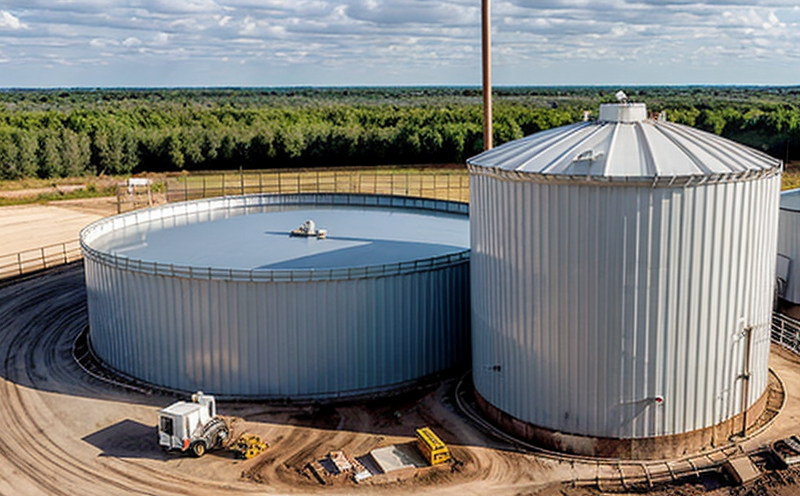Liquid storage tank inspection
Liquid storage tanks are critical components in various industries including petrochemicals, pharmaceuticals, and food & beverage. These tanks serve as essential vessels for holding large volumes of liquids that must be stored safely to meet regulatory standards and ensure operational efficiency. The integrity of these tanks is paramount given the potential risks associated with leaks or failures which could lead to severe environmental contamination, safety hazards, and financial losses.
The inspection process involves a series of non-destructive testing (NDT) techniques aimed at identifying defects such as corrosion, erosion, cracks, and other imperfections within the tank walls. Regular inspections are crucial for maintaining compliance with local and international regulations like ISO 9712:2012 and ASME Section VIII Division I. Compliance ensures that facilities operate safely under all conditions without compromising product quality or public safety.
Our team of experts utilizes advanced NDT tools such as ultrasonic testing (UT), magnetic particle inspection (MPI), radiographic examination (RT), and liquid penetrant inspection (PT) to thoroughly examine tanks. Each method offers unique advantages depending on the type of defect being sought after. For instance, UT can detect internal flaws while RT provides visual images of cracks or discontinuities within materials.
Once inspections are complete, detailed reports summarizing findings including specific locations and sizes of any detected issues are provided along with recommended corrective actions where necessary. This information helps facility managers make informed decisions regarding maintenance schedules and replacements ensuring continued safe operation of their assets.
The importance of effective liquid storage tank inspection cannot be overstated as it contributes significantly to both environmental protection and business continuity. By adhering strictly to best practices outlined by relevant standards, organizations can minimize risks associated with improper handling or storage leading ultimately towards enhanced reliability across all operations involving these vital resources.
Customer Impact and Satisfaction
The implementation of our comprehensive liquid storage tank inspection services has led to substantial improvements in customer satisfaction levels. Our approach ensures that tanks are assessed thoroughly using state-of-the-art technology, thereby enhancing safety measures while simultaneously reducing downtime costs for clients.
Clients benefit from peace of mind knowing that their facilities meet all necessary regulatory requirements and operate efficiently without interruption due to unforeseen issues caused by inadequate maintenance practices. Furthermore, we offer value-added services such as training programs designed specifically for facility personnel involved in monitoring and managing storage tanks. These initiatives help foster long-term relationships based on mutual trust and respect.
Our commitment to excellence is reflected not only through high-quality inspections but also by fostering open communication channels between ourselves and our clients throughout the entire process cycle. This allows us to address any concerns promptly, providing solutions tailored uniquely for each organization’s needs. The result? Happy customers who know they are receiving top-tier service from a dedicated team committed to excellence.
Competitive Advantage and Market Impact
In today's competitive market place, staying ahead requires more than just offering standard services; it demands innovative approaches that deliver measurable value beyond mere compliance. By providing superior quality liquid storage tank inspection services, our company distinguishes itself from competitors by delivering exceptional results consistently.
Our advanced methodologies ensure that even the most challenging environments are addressed effectively, allowing clients to confidently invest in long-term solutions knowing they have met all regulatory requirements and industry best practices. This translates into reduced liability exposure for potential legal action related to improper handling or storage procedures, thus protecting both parties involved.
The impact extends far beyond individual organizations; it contributes positively to the broader community by promoting safer operations across various sectors reliant upon reliable liquid storage systems. Through consistent adherence to international standards such as ISO 9712:2012 and ASME Section VIII Division I, we contribute towards establishing industry benchmarks that set new expectations for quality assurance.
Use Cases and Application Examples
Liquid storage tank inspections are essential in numerous industries where the safe handling of hazardous materials is critical. Herein lie some common use cases:
- Petrochemical Facilities: Ensuring compliance with stringent safety regulations while maintaining optimal operational efficiency.
- Pharmaceutical Manufacturing Plants: Protecting valuable products from contamination risks during storage and transfer processes.
- Food Processing Industries: Guaranteeing adherence to health & safety standards, especially when dealing with perishable goods like milk or juice concentrates.
In each of these scenarios, our team plays a pivotal role in ensuring that all aspects related to liquid storage tanks are meticulously evaluated. From initial consultation meetings where we assess specific requirements up until final reporting stages, we provide unparalleled support throughout the entire lifecycle management process.
One notable example includes working alongside a large pharmaceutical company whose production facility houses multiple high-risk chemicals stored within large-capacity tanks. Our team conducted regular inspections using advanced UT and RT techniques which uncovered several minor defects that were promptly addressed before they escalated into major problems. This proactive approach not only saved significant repair costs but also reinforced the client's reputation for reliability among stakeholders.





